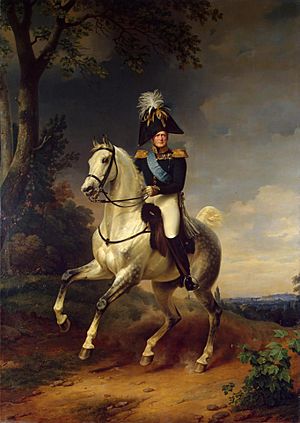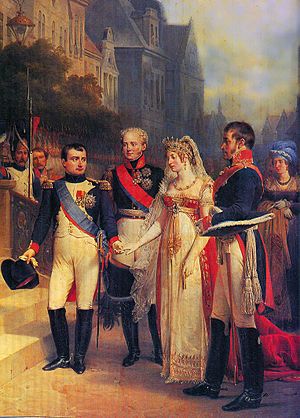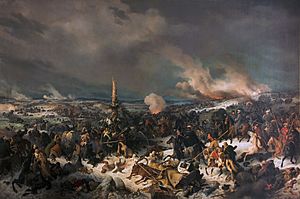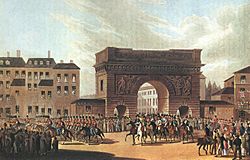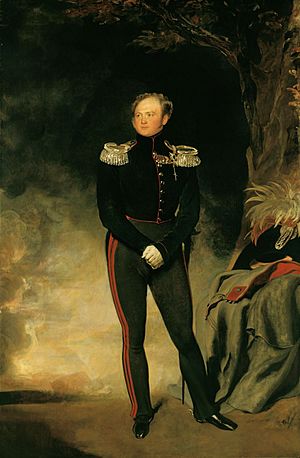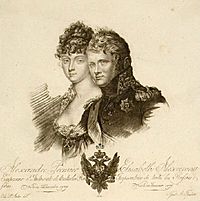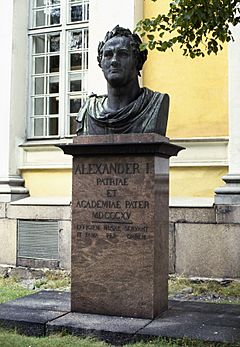Alexander I of Russia facts for kids
Quick facts for kids Alexander I |
|||||
|---|---|---|---|---|---|
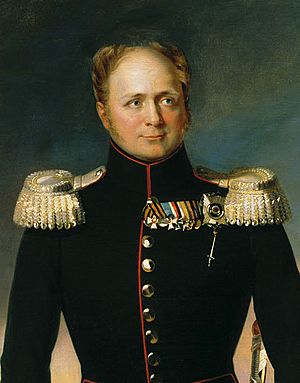
Portrait by George Dawe, c. 1825-26
|
|||||
| Emperor of Russia | |||||
| Reign | 23 March 1801 – 19 November 1825 | ||||
| Coronation | 15 (27) September 1801 | ||||
| Predecessor | Paul I | ||||
| Successor | Nicholas I | ||||
| Born | 23 December 1777 Saint Petersburg, Russian Empire |
||||
| Died | 1 December 1825 (aged 47) Taganrog, Russian Empire |
||||
| Burial | 13 March 1826 Saints Peter and Paul Cathedral, Saint Petersburg |
||||
| Spouse |
Louise of Baden
(m. 1793) |
||||
| Issue more... |
Nikolai Lukash (illegitimate) | ||||
|
|||||
| House | Holstein-Gottorp-Romanov | ||||
| Father | Paul I of Russia | ||||
| Mother | Sophie Dorothea of Württemberg | ||||
| Religion | Russian Orthodox | ||||
| Signature |  |
||||
| Military service | |||||
| Branch/service | |||||
| Battles/wars | |||||
Alexander I was the emperor of Russia from 1801 to 1825. He also became the first king of Congress Poland in 1815 and the grand duke of Finland in 1809. He was the oldest son of Emperor Paul I and Sophie Dorothea of Württemberg.
Alexander became emperor after his father, Paul I, passed away suddenly. He ruled Russia during the exciting and challenging time of the Napoleonic Wars. When he first became emperor, Alexander often spoke about making Russia more modern and free. However, in reality, he kept many of Russia's old, strict ways of ruling. Early in his reign, he started some small social changes and big educational reforms. For example, he helped build more universities.
In foreign policy, Alexander changed Russia's stance towards France many times. He was sometimes neutral, sometimes against, and sometimes allied with Napoleon. In 1805, he joined Britain against Napoleon in the War of the Third Coalition. But after big losses at the battles of Austerlitz and Friedland, he joined forces with Napoleon through the Treaty of Tilsit in 1807.
Alexander's biggest success came in 1812 when Napoleon's invasion of Russia failed completely. As a winner against Napoleon, Alexander gained new lands in Finland and Poland. He also created the Holy Alliance to stop revolutionary movements in Europe. He believed these movements were a threat to Christian leaders.
Later in his rule, Alexander became more strict and worried about people plotting against him. Because of this, he stopped many of the reforms he had started. He passed away in December 1825 from typhus while traveling in southern Russia. He had no children who lived to adulthood. After some confusion, his younger brother, Nicholas I, became the new emperor.
Contents
Early Life and Family
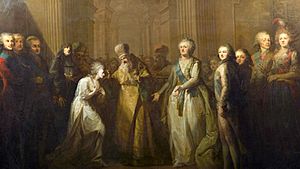
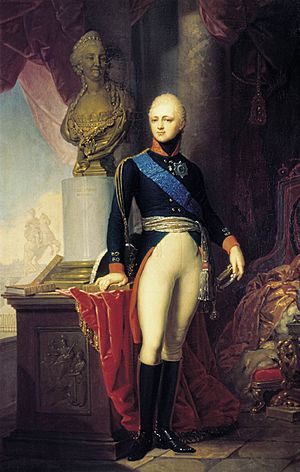
Alexander was born on December 23, 1777, in Saint Petersburg. He and his younger brother Constantine were raised by their grandmother, Catherine the Great. His grandmother chose his teachers, including Frédéric-César de La Harpe from Switzerland, who taught him about human rights and freedom. His military teacher, Nikolay Saltykov, taught him about Russia's traditional way of ruling.
When Alexander was 15, on October 9, 1793, he married 14-year-old Princess Louise of Baden. She became Elizabeth Alexeievna after joining the Orthodox Church. His grandmother arranged this marriage. Alexander often felt caught between his grandmother's grand court and his father's simpler, military-focused life at Gatchina.
Becoming Emperor
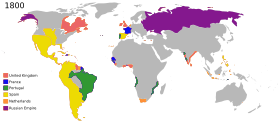
Catherine the Great passed away in November 1796, and Alexander's father, Paul, became emperor. Alexander did not like his father's rule, calling Russia a "plaything for the insane." He felt that absolute power caused many problems. This feeling likely made him want to be a more modern ruler later on. Paul I was not popular with many people in Russia.
Alexander became Emperor of Russia on March 23, 1801, after his father died. He was 23 years old. He was crowned in the Kremlin on September 15 of that year.
Ruling Russia
Alexander wanted to make Russia's government better. He formed a group of young, enthusiastic friends called the Private Committee. Their goal was to create a plan for reforms that would lead to a more modern government.
Later, Mikhail Speransky, a smart advisor, helped Alexander plan many changes. They replaced old government departments with new Ministries. They also created the State Council to improve laws. Alexander also wanted to solve the problem of serfdom, which was a system where peasants were tied to the land. He made some small changes, allowing some peasants to own land. However, most serfs were not affected until much later.
When Alexander started his rule, Russia had three universities. He made these stronger and founded three new ones. He also supported science and arts.
Wars with Napoleon
Early Alliances
When Alexander became emperor, he quickly made peace with Britain. He also formed a close alliance with Prussia, based on friendship with King Frederick William III of Prussia and his wife.
At first, Alexander admired Napoleon Bonaparte and French ideas. But after Napoleon became very powerful and executed a French prince, Alexander changed his mind. He saw Napoleon as a "tyrant" and broke off diplomatic ties with France. Alexander believed it was his duty to stop Napoleon's power.
Fighting Napoleon
Alexander saw himself as fulfilling a special mission to protect Europe from Napoleon. He wanted to create a system where countries respected each other's rights and worked together for peace.
However, Napoleon defeated the Russian army at the Battle of Austerlitz and the Battle of Friedland in 1807. After these losses, Alexander met Napoleon at Tilsit on June 25, 1807. Napoleon offered to share control of the world with Alexander. This meeting led to an alliance between France and Russia.
The alliance allowed Alexander to take Finland from Sweden in 1809. But the friendship between Alexander and Napoleon did not last. Alexander realized Napoleon was only using him to gain more power in Europe.
The French Invasion of Russia (1812)
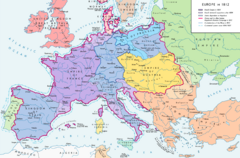
Relations between France and Russia became very tense after 1810. Napoleon had not kept his promises, and his trade system was hurting Russia's economy. Alexander secretly allowed trade with Britain and then officially left Napoleon's trade system in 1810.
In the summer of 1812, Napoleon invaded Russia with a huge army. The Russian army retreated deep into Russia, drawing Napoleon's forces further in. On September 7, the two armies fought the Battle of Borodino, one of the biggest and bloodiest battles of the Napoleonic Wars. The battle was very costly for both sides, but neither won a clear victory.
A week later, Napoleon entered Moscow. But the city was empty, and the Russians set parts of it on fire. Alexander refused to surrender. After a month, Napoleon's army had to leave Moscow. As they retreated, they suffered terribly from lack of food, the harsh Russian Winter, and attacks from Russian peasants and Cossacks. By the time they left Russia in December 1812, Napoleon's army was almost completely destroyed.
This invasion was a major turning point in the Napoleonic Wars. Napoleon's power was greatly weakened. Russia's allies, Prussia and Austria, then joined Russia against Napoleon.
The Sixth Coalition and Victory
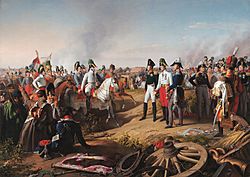
After the victory in Russia, a new alliance called the Sixth Coalition was formed. It included Russia, Austria, Prussia, Britain, Sweden, and Spain. In 1813, the Coalition defeated Napoleon at the Battle of Leipzig. Alexander, as the leader of the Coalition forces, ordered his armies to invade France.
In January 1814, the Coalition armies entered France. Despite Napoleon's efforts, the Coalition advanced towards Paris. On March 31, 1814, Paris surrendered. Alexander, along with the King of Prussia, triumphantly entered the city. He offered generous terms to the French, saying he brought peace, not destruction.
Napoleon was forced to give up his power on April 6. He was sent away to the Isle of Elba. This marked the end of the War of the Sixth Coalition.
After the Wars
Peace and New Ideas
After Napoleon's defeat, Alexander became one of the most powerful rulers in Europe. He became very religious and believed he had a divine mission to bring peace to Europe. He was influenced by a religious woman named Barbara von Krüdener, who helped him find inner peace.
At the Congress of Vienna, where European leaders met to reshape Europe, Alexander wanted to create a lasting peace. He pushed for the Holy Alliance, an agreement based on Christian principles, to prevent future wars and revolutions. However, other leaders, like Klemens Wenzel von Metternich from Austria, were suspicious of Alexander's motives.
Changing Views
Alexander had supported some liberal ideas, like allowing a constitution for Poland in 1815. But after 1818, his views began to change. He became worried about revolutionary groups and plots against him. He grew closer to Metternich, who believed in strict control to prevent revolutions.
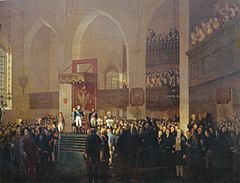
Alexander still believed in "free institutions" but thought liberty should have "just limits" to maintain order. When revolutions broke out in other parts of Europe, Alexander became even more convinced that strong rule was needed. In 1820, he signed the Troppau Protocol, which allowed countries to interfere in other nations' internal affairs to stop revolutions.
The Greek Revolt
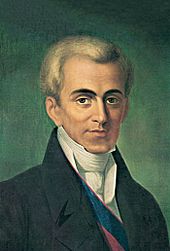
In 1821, Alexander heard about the Greek revolt against the Ottoman Empire. This was a difficult situation for him. On one hand, he wanted a stable Europe. On the other hand, he felt a duty to protect Orthodox Christians, like the Greeks, from the Ottomans.
At first, he followed Metternich's advice and did not support the Greek rebels. He even removed their leader, Alexander Ypsilantis, from the Russian army. However, Alexander later tried to find a way to help the Greeks while still keeping peace in Europe. He offered to act on behalf of Europe to help the Greeks, but Metternich opposed this.
Personal Life
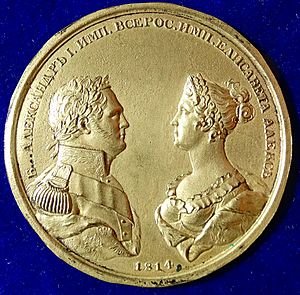
On October 9, 1793, Alexander married Louise of Baden. He later said that this marriage, arranged by his grandmother, was not a happy one for either of them. Their two daughters passed away when they were very young. Towards the end of his life, Alexander and his wife became closer, especially after the death of his daughter Sophia Naryshkina.
Death
As he got older, Alexander became more religious and private. He also grew more suspicious of people around him. In the autumn of 1825, he traveled to southern Russia because his wife was ill. During this trip, he caught typhus and passed away in the city of Taganrog on November 19, 1825.
His death was not known in the capital for some time because Taganrog was far away. His two brothers did not want to become emperor, which caused some confusion. His wife passed away a few months later. Alexander was buried at the St. Peter and Paul Cathedral in Saint Petersburg on March 13, 1826. There are some legends that he did not die but became a hermit in Siberia, but historians do not believe these stories.
Children
| Name | Birth | Death | Notes |
|---|---|---|---|
| By his wife Louise of Baden | |||
| Maria/Maryia Alexandrovna, Grand Duchess of Russia | 1799 | 1800 | Died young. |
| Elisabeta/Elisaveta Alexandrovna, Grand Duchess of Russia | 1806 | 1808 | Died young. |
| Other Children | |||
| Sophia Narishkina | 1805 | 1824 | Died at age eighteen. |
| Nikolai Yevgenyevich Lukash | 1796 | 1868 | Had children. |
| Maria Alexandrovna Parijskaia | 1814 | 1874 | |
| Gustaw Ehrenberg | 1818 | 1895 | A Polish revolutionary and poet. |
Archives
Alexander's letters to his grandfather, Frederick II Eugene, Duke of Württemberg, are kept in the State Archive of Stuttgart, Germany.
Honours
He received many awards and honors, including:
 Russian Empire:
Russian Empire:
- Order of St. Andrew
- Order of St. Alexander Nevsky
- Order of St. Anna, 1st Class
 Sweden:
Sweden:
- Royal Order of the Seraphim
- Order of the Sword, 1st Class
 Kingdom of Prussia:
Kingdom of Prussia:
- Order of the Black Eagle
- Iron Cross (1813) 2nd Class
- France:
 French Empire: Grand Eagle of the Legion of Honour
French Empire: Grand Eagle of the Legion of Honour Kingdom of France:
Kingdom of France:
- Grand Cross of the Legion of Honour
- Order of the Holy Spirit
 Denmark: Order of the Elephant
Denmark: Order of the Elephant United Kingdom: Order of the Garter
United Kingdom: Order of the Garter Spain: Order of the Golden Fleece
Spain: Order of the Golden Fleece Austrian Empire: Military Order of Maria Theresa
Austrian Empire: Military Order of Maria Theresa Netherlands: Military William Order
Netherlands: Military William Order Kingdom of Sardinia: Supreme Order of the Most Holy Annunciation
Kingdom of Sardinia: Supreme Order of the Most Holy Annunciation Kingdom of Portugal: Sash of the Three Orders
Kingdom of Portugal: Sash of the Three Orders
Images for kids
See also
 In Spanish: Alejandro I de Rusia para niños
In Spanish: Alejandro I de Rusia para niños
- Aleksey Arakcheyev
- Archimandrite Photius
 | James Van Der Zee |
 | Alma Thomas |
 | Ellis Wilson |
 | Margaret Taylor-Burroughs |


